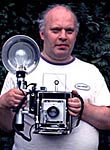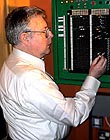|
|
 
|
|
Author
|
Topic: Converting a Ni-CD Dremel Pack to NiMH
|
|
|
|
|
|
|
|
|
|
|
|
|
Stephen Furley
Film God

Posts: 3059
From: Coulsdon, Croydon, England
Registered: May 2002
|
 posted 06-02-2009 01:21 PM
posted 06-02-2009 01:21 PM




[QUOTE] NiCd - old school
NiH - a stepping stone to
NiMH - pretty good
LiION - the latest and greatest [/QUOTE
Li-ION tends to be used on small things like mobile 'phones, and lead acid and lead acid is totally different in terms of charging of course, but there was another member of the 'Ni' family, Ni-Fe (pronounced knife), and some of these were very long lived. When I was at college in the '70s we had some in the physics lab which had recently been removed from the fire alarm system and which would have been installed in the early '50s.
I also remember seeing an advert for a battery company about 5-10 years ago which featured one of their batteries which had just been taken out of use in a railway signal box due to a re-signalling scheme. It had been installed in the week or month, I can't remember which, that war broke out, in 1939.
These were wet batteries, which had to be topped up with distilled water like traditional lead acid ones. The casing of them was metal, and several cells were fitted into a protective wooden crate.
| IP: Logged
|
|
Bernard Tonks
Jedi Master Film Handler

Posts: 619
From: Cranleigh, Surrey, England
Registered: Apr 2001
|
 posted 06-03-2009 11:49 AM
posted 06-03-2009 11:49 AM




I thought this might be of interest to some from the Woodley website. There are other technical items, page Anorak Man.
http://www.geocities.com/woodleyuk/index3.htm
Battery Power
Once upon a time when we went to a shop to buy a battery it was an easy choice. Now there are so many different types of batteries available. Whether you choose AA, AAA, PP3, C and D types you have to decide between alkaline, Lithium, Nickel-Cadmium, Nickel-Metal Hydride and Hybrid NI-MH. Do you know the difference between that lot? Remember, if you buy the wrong type of battery you could be wasting your money. Now when you go shopping for a battery look carefully at the details on the side of it before deciding what type to get. Many manufacturers put the capacity of the battery on the side especially for rechargeables and you will see there is a large difference in how long they will last or how long they need charging for. In general the cheapest disposables will only be suitable for remote controls or similar low consumption equipment. For high drain or high usage items you can go for Lithium disposals or even rechargeable batteries.
Disposable Batteries:-
Alkaline
Alkaline batteries have been around for years and provide good all round performance. Alkaline batteries can be split into two distinct groups, premium and standard alkaline. Premium alkaline are better for high-tech devices and provide about 20% more power than standard alkaline batteries which are ideal for everyday household devices such as remote controls and smoke alarms and provide dependable long lasting power. Alkaline batteries are much longer lasting than ‘heavy-duty’ zinc carbon batteries and alkaline batteries have longer shelf lives.
Lithium
Not to be confused with lithium-ion which is rechargeable technology used for mobile phones and digital camera battery packs. Disposable lithium provides amazing performance in high-drain devices. Disposable lithium batteries last up to seven times longer than standard alkaline batteries in a high drain devices, such as digital cameras and MP3 players. They are the best performing of all the disposable batteries, and work well at extreme temperatures
Rechargeable Batteries:-
These will save you money and will out perform some types of disposable batteries. They cost twice as much as disposable batteries but you will save money many times over.
Nickel-Cadmium (Ni-Cd)
These are good value for money and are most suitable for mid drain items such as radios and torches. As they suffer from memory effect they should be run right down before you recharge them to maintain their performance.
Nickel-Metal Hydride (Ni-MH)
These are most suitable for high drain appliances and can last four times longer on one charge than alkaline batteries in a digital camera. These don't suffer from the memory effect and don't have to be run down before they are recharged. They do lose some of their charge when not in use so they are not suitable for smoke alarms and remote controls.
Hybrid Ni-MH (Hybrio)
The latest generation of rechargeable battery. Hybrio batteries offer all the advantages of rechargeable while performing like alkaline batteries in many ways. Hybrio come charged up and ready to use out of the pack, like alkaline. Hybrio batteries hold their charge for much longer than ordinary Ni-MH batteries when not in use. This means they are much better for low drain uses such as remote controls and clocks than any other rechargeable battery. Hybrio is the first truly multi-purpose rechargeable battery and because it comes charged and ready to use, it offers the ultimate in convenience and long term value for money.
| IP: Logged
|
|
|
|
Charles Greenlee
Jedi Master Film Handler

Posts: 801
From: Savannah, Ga, U.S.
Registered: Jun 2006
|
 posted 06-09-2009 02:55 PM
posted 06-09-2009 02:55 PM





I have an old, standard dumb, radio shack, nicad charger and have experimented charging a few different types of batteries.
Nicad - Its intended battery type, so works well.
NiMH - Also works well, but should be monitored and checked on. Unlike Nicads, the batteries can't remain under a constant charge without some monitoring circuitry which this charger doesn't have.
Lithium (Disposable) - These seem to behave similarly to the NiMH, though should be monitored more vigilantly. Supposedly non-rechargeable, but I got them to charge.
Alkaline (Standard disposable) - These are infamously non-rechargeable, though I did manage to, with extreme care, get them take a charge. These batteries seem to charge very rapidly, within mere minutes. They get hot. Thus they should be removed and checked with the diligence of someone with OCD, and checked with a tester. I'd feel them when they got hot to the touch, and then pull them, test them, let them cool. If charged, then I'd stash them away, if not, I'd put them back in for a few mins.
!!!I will note that you should only charge the batteries in their intended charger type, or not at all for nonrechargables. I did my little tests with the understanding that I risk myself, my batteries, my charger, my table, etc. I also took as many precautions as I could. To quote Mythbusters, don't try any of this at home. Ever!
To answer the NiMH battery on a Nicad charger, it is possible, but not reccommended, as the different type charge at different rates. Nicad chargers either don't have a charge monitoring circuit, or if they do, they're designeded for the charging curve of a Nicad and not NiMH. It's best to use a NiMH charger, or one that can do both.
| IP: Logged
|
|
|
|
All times are Central (GMT -6:00)
|
|
Powered by Infopop Corporation
UBB.classicTM
6.3.1.2
The Film-Tech Forums are designed for various members related to the cinema industry to express their opinions, viewpoints and testimonials on various products, services and events based upon speculation, personal knowledge and factual information through use, therefore all views represented here allow no liability upon the publishers of this web site and the owners of said views assume no liability for any ill will resulting from these postings. The posts made here are for educational as well as entertainment purposes and as such anyone viewing this portion of the website must accept these views as statements of the author of that opinion
and agrees to release the authors from any and all liability.
|

 Home
Home
 Products
Products
 Store
Store
 Forum
Forum
 Warehouse
Warehouse
 Contact Us
Contact Us




 Printer-friendly view of this topic
Printer-friendly view of this topic

















